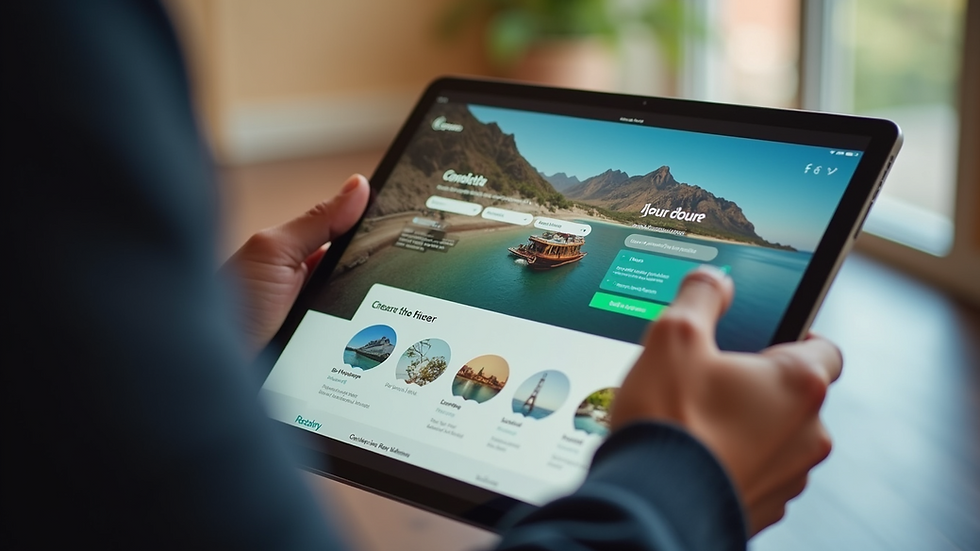Exploring the Future of Digital Travel Platforms
- Paniz Talesh
- Sep 1, 2025
- 4 min read
The travel industry is undergoing a profound transformation, driven by rapid advancements in technology and changing consumer behaviors. Digital travel platforms are at the heart of this evolution, reshaping how travelers plan, book, and experience their journeys. These platforms offer convenience, personalization, and seamless integration of services, making travel more accessible and enjoyable than ever before. As we look ahead, the future of digital travel promises even more innovation, with emerging technologies and new business models set to redefine the landscape.
The Rise of Digital Travel and Its Impact
Digital travel has revolutionized the way people explore the world. Gone are the days when travelers relied solely on travel agents or printed brochures. Today, digital tools empower users to research destinations, compare prices, read reviews, and book trips all from their smartphones or computers.
Some key impacts of digital travel include:
Increased accessibility: Travelers can access a wealth of information and services anytime, anywhere.
Personalized experiences: Algorithms analyze preferences to offer tailored recommendations.
Real-time updates: Flight delays, weather changes, and local events are communicated instantly.
Cost efficiency: Price comparison tools help users find the best deals.
Social sharing: Travelers can share experiences and tips, influencing others’ choices.
For example, mobile apps now allow users to book flights, hotels, and activities in one place, often with integrated payment systems and customer support. This convenience has boosted travel frequency and expanded the market to new demographics.

How Digital Travel Platforms Are Shaping the Industry
Digital travel platforms serve as centralized hubs that connect travelers with service providers such as airlines, hotels, tour operators, and local guides. These platforms leverage technology to streamline the entire travel process, from discovery to post-trip feedback.
Key features driving their success:
User-friendly interfaces: Simplified navigation and intuitive design enhance user experience.
Integration of services: Combining transportation, accommodation, and activities in one platform.
AI and machine learning: Personalized suggestions based on user behavior and preferences.
Secure payment gateways: Ensuring safe and convenient transactions.
Community and social features: Enabling reviews, ratings, and travel forums.
For instance, platforms like digital tourism platform offer immersive experiences by connecting travelers with local hosts and unique activities, fostering authentic cultural exchanges. This approach not only benefits travelers but also supports local economies and sustainable tourism.

What is a platform in tourism?
A platform in tourism is a digital or physical space that facilitates interactions between different stakeholders in the travel ecosystem. These stakeholders include travelers, service providers, local communities, and businesses. The platform acts as an intermediary, enabling transactions, communication, and information exchange.
Types of tourism platforms:
Booking platforms: Websites or apps that allow users to reserve flights, hotels, and tours.
Experience platforms: Services that connect travelers with local experiences, such as guided tours or cooking classes.
Review platforms: Sites where travelers share feedback and ratings, influencing others’ decisions.
Community platforms: Forums and social networks focused on travel discussions and advice.
The value of a tourism platform lies in its ability to aggregate diverse offerings and present them in a cohesive, accessible manner. This reduces friction in the travel planning process and enhances overall satisfaction.
Example:
A traveler planning a trip to Italy might use a platform to book a flight, reserve a boutique hotel, and sign up for a vineyard tour hosted by a local expert. The platform ensures all bookings are synchronized and provides customer support throughout the journey.

Emerging Technologies Driving the Future of Digital Travel
The future of digital travel platforms is closely tied to technological innovation. Several emerging technologies are poised to transform how travelers interact with platforms and experience destinations.
Key technologies include:
Artificial Intelligence (AI): Enhances personalization by analyzing vast data sets to predict traveler preferences and optimize itineraries.
Virtual Reality (VR) and Augmented Reality (AR): Allow users to preview destinations and experiences virtually before booking.
Blockchain: Improves transparency and security in transactions, loyalty programs, and identity verification.
Internet of Things (IoT): Connects devices and services to provide real-time updates and smart travel solutions.
5G Connectivity: Enables faster data transfer and richer multimedia content, enhancing mobile travel experiences.
For example, VR tours can help travelers explore hotel rooms or landmarks remotely, reducing uncertainty and increasing confidence in their choices. AI chatbots provide instant customer service, answering queries and assisting with bookings 24/7.
Actionable recommendation:
Travel businesses should invest in these technologies to stay competitive. Integrating AI-driven chatbots or offering VR previews can significantly improve customer engagement and satisfaction.
Strategies for Travelers to Maximize Digital Travel Platforms
To get the most out of digital travel platforms, travelers can adopt several practical strategies:
Research multiple platforms: Compare offerings and prices across different sites to find the best deals.
Use filters and preferences: Narrow down options based on budget, interests, and travel dates.
Read reviews carefully: Look for detailed feedback and patterns rather than isolated comments.
Leverage loyalty programs: Join rewards schemes to earn points and access exclusive discounts.
Stay updated: Enable notifications for flight changes, special offers, and travel advisories.
Engage with local hosts: Choose platforms that connect you with authentic local experiences for deeper cultural immersion.
By following these tips, travelers can enjoy smoother planning, better value, and richer experiences.
Digital travel platforms are reshaping the way we explore the world. Their ability to integrate services, personalize experiences, and leverage cutting-edge technology makes them indispensable tools for modern travelers. As these platforms continue to evolve, they will unlock new possibilities for discovery, convenience, and connection. Embracing these innovations today will prepare travelers and businesses alike for the exciting journeys ahead.









Comments